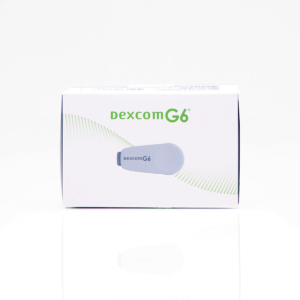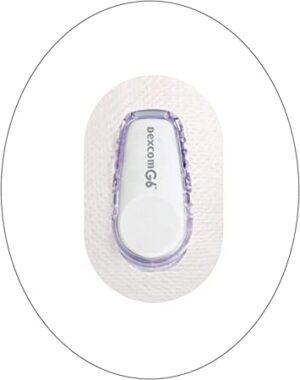Common queries answered
Frequently Asked Questions
Standard shipping which is free on all orders is 3-5 days, but you may opt into other shipping methods that will come with an additional charge
Due to the nature of these products we are only able to accept returns if there is either something wrong with your item, an error on our end, or you r returning the item the same way it was received
A Dexcom G6 Sensor is a small device that is placed on the skin to measure glucose levels in the interstitial fluid. It is used with a Dexcom G6 Transmitter to transmit the data to a compatible device.
Diabetes is a chronic disease that occurs when the body is unable to produce enough insulin or is unable to effectively use the insulin it produces. Insulin is a hormone that regulates blood sugar levels, and when there is a problem with insulin production or function, blood sugar levels can become too high. Symptoms of diabetes include frequent urination, excessive thirst, unexplained weight loss, fatigue, blurred vision, slow-healing cuts or sores, and tingling or numbness in the hands or feet. However, some people with diabetes may not experience any symptoms. |
The Dexcom G6 transmitter is a medical device used for continuous glucose monitoring (CGM) in people with diabetes. It is a small device that attaches to the skin with a sensor that measures glucose levels in the interstitial fluid, which is a thin layer of fluid that surrounds cells in the body. The transmitter wirelessly sends glucose data to a receiver or a smartphone app, allowing people with diabetes and their healthcare providers to monitor blood sugar levels in real time and make informed treatment decisions. The Dexcom G6 transmitter is FDA-approved and is commonly used by people with type 1 and type 2 diabetes.
Managing diabetes is essential to prevent or delay its serious health complications. Uncontrolled diabetes can damage major organs such as the heart, kidneys, eyes, and nerves leading to blindness, kidney failure, amputations, and even premature death.
Effective diabetes management helps to keep blood sugar levels in a healthy range and reduces the risk of developing associated health concerns. This includes monitoring blood sugar levels, taking medications as prescribed, following a healthy diet, and engaging in regular physical activity.
Good diabetes management also helps improve quality of life by reducing symptoms like fatigue, frequent urination, and thirst, and by reducing the risk of depression and anxiety associated with diabetes.
The Dexcom G6 sensor needs to be changed every 10 days, or as recommended by the healthcare provider. After 10 days, the sensor loses accuracy and needs to be replaced with a new one to ensure reliable glucose monitoring
People with diabetes use a blood sugar testing kit to monitor their blood sugar levels regularly. By doing so, they can adjust their diet, and physical activity to keep their blood sugar levels within a healthy range. Regular monitoring also helps identify patterns in blood sugar levels, which can help them and their healthcare provider make more informed treatment decisions.
The Dexcom G6 Receiver Kit includes a handheld device that displays real-time glucose data transmitted wirelessly from a Dexcom G6 transmitter attached to the skin. The receiver also provides alerts and notifications for high and low blood sugar levels that assist them and the healthcare professional in adjusting medications. The Dexcom G6 Receiver Kit is FDA-approved and is commonly used by people with type 1 and type 2 diabetes who prefer a standalone device for glucose monitoring.
Diet plays a crucial role in managing diabetes by influencing blood sugar control, body weight, and overall health. Eating a healthy diet, rich in whole grains, fruits, and vegetables, can help improve blood sugar control by providing complex carbohydrates that are slowly digested and absorbed, reducing the risk of spikes in blood sugar levels. Limiting simple carbohydrates, saturated fats, and added sugars can also help manage diabetes by reducing insulin resistance, improving blood lipid levels, and supporting healthy body weight. A balanced diet that includes lean proteins and healthy fats can also help regulate hunger and prevent overeating, supporting weight management and reducing the risk of obesity-related complications of diabetes. Overall, a healthy diet is an essential component of diabetes management and can help prevent serious complications associated with the condition. |


